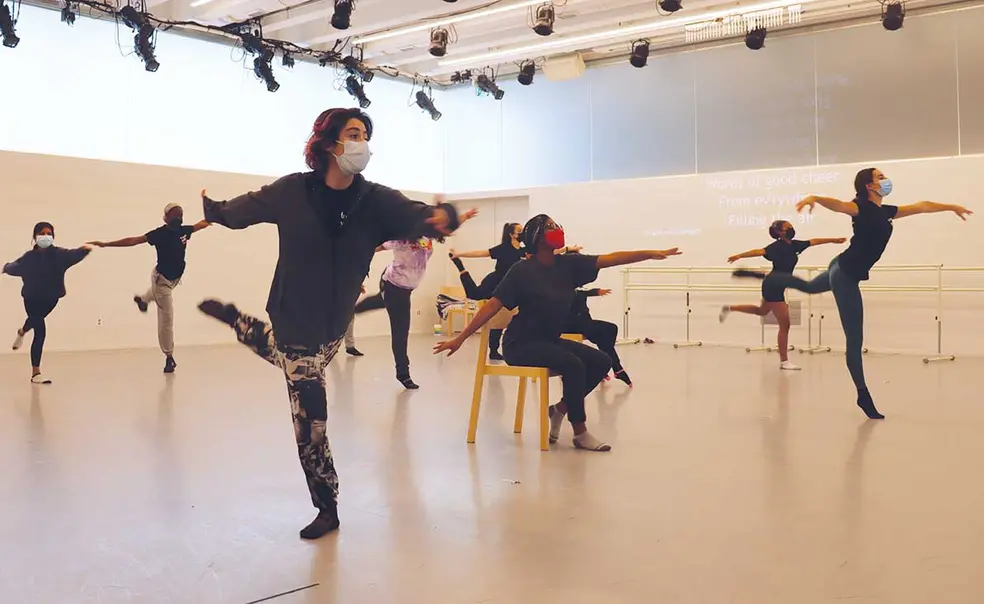Princeton’s Ties and Collaborations in Trenton Are Expanding
Princetonians increasingly connect with schools and service groups to expand college access and more
When arts enthusiast Lou Chen ’19 was a Princeton freshman, he had the idea to create an orchestra composed of Trenton high schoolers and University student mentors. Chen wanted to work directly with Trenton school staff to supplement their curricula, so he turned to Jason Klugman, director of the Princeton University Preparatory Program (PUPP), who already was involved with Trenton youth, to ask for help.
Thanks in part to that connection, the Saturday Morning Arts program has grown into a community of more than 120 — half of whom are Princeton students. Every Saturday morning during the academic year, you can find them dancing, singing, acting, and playing instruments at the Lewis Center for the Arts. It’s kept Chen, now program manager of Trenton Arts at Princeton (TAP), busy, though he’s also thinking about how to strengthen and expand the program.
As TAP continues to evolve, so do the University’s efforts to create and maintain ties with the Trenton community and to collaborate with other organizations.
In 2018, a consortium of higher-education institutions, public schools, and youth-service organizations founded the Greater Trenton College Access Network (TCAN). Its mission is to strengthen college-access and workforce-development opportunities for high school students in the Trenton area.
TCAN co-chair Klugman, who also serves as the senior director of college-preparation initiatives at Princeton’s Emma Bloomberg Center for Access and Opportunity, helped organize the first TCAN meeting, but he said there was already an informal network that had collaborated for years. Now, representatives from roughly two dozen organizations — including the University, HomeWorks, and the Isles Youth Institute — meet monthly.
Michelle Thompkins, Klugman’s TCAN co-chair and director of youth engagement at Millhill Child & Family Development, sees many benefits. Through TCAN connections, she has recruited youth for Millhill’s programs, secured tutoring and college tours for students, and co-wrote a successful five-figure STEM grant proposal.
But Thompkins also thinks there’s room for growth and improvement. She’s particularly excited about potential opportunities with the year-old Emma Bloomberg Center, but also notes that “we see this as a network where everybody’s got a seat around that King Arthur roundtable, and we all have an equal responsibility in that effort to make it a success.”
Though TCAN serves students throughout the region, “Trenton is the community that has the most need,” said Klugman. A 2020 TCAN report found that 283 of the 347 graduates who participated in TCAN hailed from Trenton Central High School (TCHS).
Duncan Harrison Jr., assistant director for regional affairs at Princeton and former councilman-at-large in Trenton, estimates there have been “hundreds of partnerships” between the University and Trenton. “I think there are a lot of success stories, and we want to continue to build upon those success stories through Princeton University and through the work that the different programs are doing,” he said.
Trenton native Tieisha Tift is one such story. After joining PUPP as a ninth-grader, she became valedictorian of her class at TCHS, earned her bachelor’s degree from Columbia University, and, in 2018, returned to Princeton as a staff member. Tift is now the assistant director for college preparation at the Emma Bloomberg Center, which houses PUPP.
“I didn’t know [PUPP] would have such an impact on me,” she said. “It shaped my future.”
Tift works alongside fellow Trenton native and PUPP alum Anna Cabrera, who, in her role as assistant director for family engagement at the Emma Bloomberg Center, meets with families of high school students to provide guidance. She comes armed with tissues, as she often finds the families are overwhelmed with gratitude.
Cabrera empathizes. When she was a TCHS student, she said her mother “felt ashamed that she couldn’t give me the answers or be more supportive. And now, being the mother of a 16-year-old, I know what that would feel like.”
That memory motivates her. “I want to be the person that I needed when I was in high school.”










No responses yet